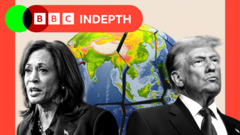The upcoming US election poses critical questions about America's future role in a tumultuous world. From military alliances to climate actions, the leadership of Kamala Harris or Donald Trump could steer various international conflicts and global policies in vastly different directions.
The Ripple Effect: How the Upcoming US Election Could Reshape Global Dynamics

The Ripple Effect: How the Upcoming US Election Could Reshape Global Dynamics
With the US presidential election approaching, the potential ramifications of leadership change resonate across the globe, influencing military, economic, and humanitarian landscapes.
As the US gears up for its presidential election next week, the world holds its breath, contemplating the potential aftermath. Will Vice President Kamala Harris continue the legacy of Joe Biden, reinforcing the idea that “America cannot retreat,” or will former President Donald Trump redefine the landscape with his “America first” rhetoric?
The stakes are high; America’s influence is increasingly scrutinized as regional powers forge their own paths, challenging Washington’s role in global affairs. Many observers warn that a transition in leadership could have consequential effects on military strategies, economic relations, and humanitarian efforts across the globe.
Behind the military curtains, former NATO deputy secretary general Rose Gottemoeller warns that a Trump presidency could resurrect fears in Europe reminiscent of his past threats to withdraw from NATO. Currently, the US accounts for two-thirds of NATO's overall military spending, and while Trump argues for burden-sharing among member nations, his unpredictable stances raise alarms. Should Harris emerge victorious, Gottemoeller believes the alliance's integrity will be preserved, yet cautions that Europe will still face pressure to enhance its defense spending.
In a world marked by rising tensions and conflict, including the ongoing crises in Ukraine and the Middle East, the next president's approach to international diplomacy becomes crucial. Comfort Ero, president of the International Crisis Group, expresses concern that the US’s moral high ground is eroding, as discrepancies in its responses to conflicts in Ukraine versus Gaza become glaringly apparent. Harris may carry on from Biden’s approach of supporting Ukraine while navigating the complex Israeli-Palestinian conflict. Conversely, Trump has hinted at a hands-off approach, fostering worries about a potential deal with Russia that overlooks Ukraine’s sovereignty.
Trade relations also hang in the balance. China expert Rana Mitter posits that Trump’s proposed tariffs could shake the global economy substantially, while Harris’s presidency would likely maintain current ties. Both candidates are expected to adopt firm stances on Beijing’s ascendancy, but their methods could differ substantially.
The looming climate crisis adds another layer of complexity. Humanitarian leaders, like Mary Robinson of the Elders, emphasize the need for US leadership in combating climate change. Trump’s dismissive tone toward environmental initiatives raises alarms among climate advocates, while Harris is urged to foster momentum toward a greener future.
Finally, the outcome of this election bears immense significance for humanitarian initiatives worldwide, as underscored by Martin Griffiths, former UN Under-Secretary-General. A Harris victory might restore a sense of principled leadership, while a Trump return could exacerbate global instability.
As global players await the election result, the ramifications for the future of international cooperation, conflict resolution, and humanitarian support are poised to create ripples that extend far beyond the borders of the United States.






















